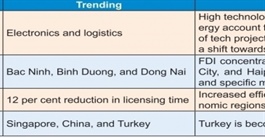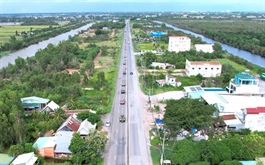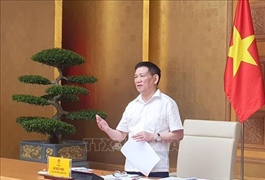Digital assets now on a legitimate footing
Digital assets now on a legitimate footing
Vietnam’s robust regulatory framework for innovation, particularly in terms of digital assets, is expected to create prospects for foreign fundraising and nurture a forward-looking environment for the digital economy.
For the first time, digital assets have been referenced in recent legislative drafts, laying the groundwork for their legal recognition as a legitimate form of property and paving the way for transparent, sustainable market development.
The regulatory landscape for innovation, especially within the digital asset space, was a central topic at an investment conference held in Hanoi two weeks ago, highlighting the government’s intent to shape an enabling legal environment for the digital economy.
According to Nguyen Khac Lich, director of the IT department under the Ministry of Science and Technology, around 10 laws related to innovation and digital technology are either in development or have already been passed, forming a comprehensive legal framework for the digital economy.
“In the short term, the Law on the Digital Technology Industry, with detailed provisions on digital assets, will lift an estimated 21 million Vietnamese holders of these assets out of the legal grey zone. It formally classifies digital assets as a form of property under civil law, protected on par with physical assets,” Lich said.
Among the laws that have already been adopted are the Law on the Digital Technology Industry, the Law on Data, and the Law on Science, Technology, and Innovation. In addition, four others are currently under review or in the early stages of implementation.
The Law on the Digital Technology Industry, passed in June, is set to take effect in January 2026. Under the law, digital assets are recognised as civil property defined in digital form, created, issued, stored, transferred, and authenticated using digital technology in an electronic environment. The move is expected to establish a critical foundation for a more transparent and robust digital asset market in Vietnam.
According to blockchain analytics firm Chainalysis, Vietnam ranks among the world’s top countries for cryptocurrency adoption, with 17 per cent of the population engaging in digital asset transactions, 3-4 times the global average. Annual inflows into the market have surpassed $100 billion, reflecting the sector’s considerable untapped potential.
Mai Huy Tuan, CEO of SSI Digital, said the legislative recognition of digital assets is something Vietnam’s blockchain startup community has long awaited. In the past, startups were often forced to register legal entities in jurisdictions such as Singapore or Dubai to develop their products.
“Now, they can operate transparently within Vietnam, reduce compliance costs, and receive legal support domestically. This recognition also opens the door to international fundraising, global distribution of Vietnamese-developed digital assets, and new contributions to national tax revenue,” he said.
Phan Duc Trung, chairman of tech firm 1Matrix, noted that Vietnam’s digital asset market was previously dominated by offshore service providers and informal fundraising activities that lacked transparency.
“Today, the landscape has expanded well beyond small tech startups, attracting major players such as Techcombank, Techcom Securities, Vingroup, Masan, and HDBank,” Trung said. “With the legal framework in place, capital mobilisation will become public, legally protected, and more accessible, reducing investor risk and creating opportunities for credible domestic ventures.”
From a global perspective, Richard Teng, CEO of Binance, emphasised blockchain’s role in combating money laundering due to its traceability, with illicit flows accounting for just 0.02 per cent of global transactions.
Binance remains the world’s largest digital asset exchange, processing more than $90 billion in daily transactions and serving over 280 million registered users, with a global market share exceeding 41 per cent.
“Vietnam is emerging as a critical node in the global digital asset economy, and will play a pivotal role in the next wave of financial innovation, including Web3, AI, stablecoins, and tokenised assets,” Teng said.
According to a joint report by Boston Consulting Group and ADDX Singapore, the global digital asset market surpassed $2 trillion by mid-2025 and is projected to reach $16.1 trillion by 2030.
Amid this growth, governments from around the world are competing to regulate and harness the sector. Singapore, China, and members of the European Union are piloting central bank digital currencies as part of a broader push to manage digital value flows.
In parallel, jurisdictions such as Singapore and Switzerland have launched sandboxes to enable small businesses to raise capital legally through tokenised securities.
Real estate is also undergoing tokenisation. In markets like the US, UAE, and Germany, investors can now buy fractional ownership in property for just a few hundred US dollars, enabled by digital asset infrastructure.
In the carbon credit space – essential for achieving net-zero goals – regions including Europe, China, and South Korea are piloting blockchain-based platforms to ensure transparency, traceability, and global interoperability.
The Vietnam Blockchain Association reports that more than 1,000 blockchain firms have been established over the past five years, many of which have used token-based models to raise capital from global communities. Vietnam’s digital asset market is projected to reach $2.9 billion by 2026, with a compound annual growth rate of around 21.5 per cent, according to Statista.
- 10:55 23/07/2025
























